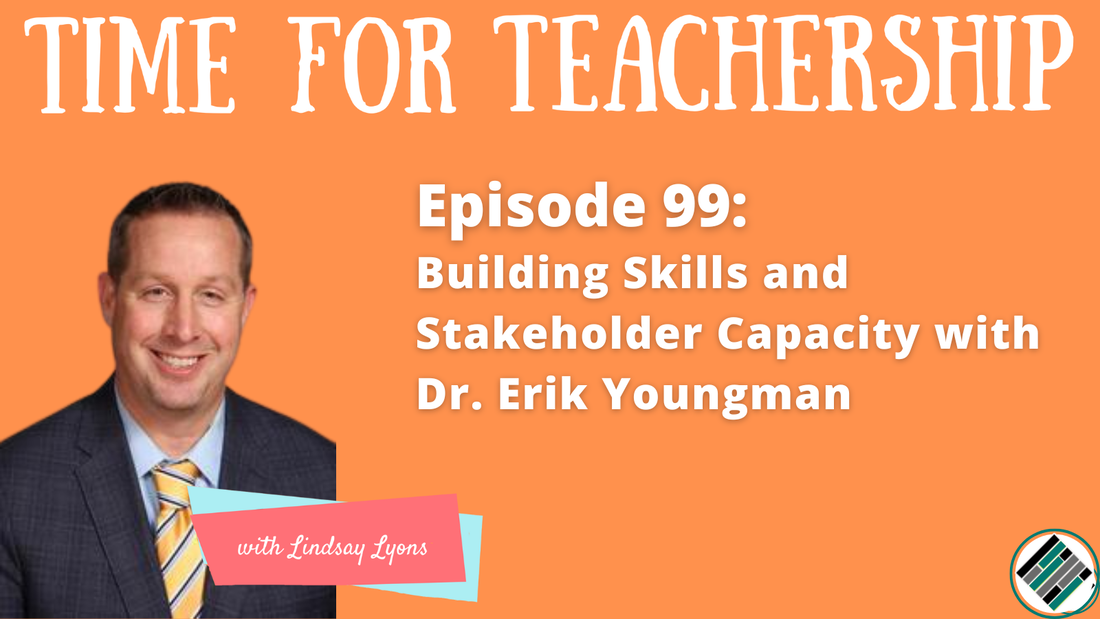
Listen to the episode by clicking the link to your preferred podcast platform below:
How are we effectively educating students through a lens of equity and inclusion? And how are we preparing students for a future filled with unpredictability? These are two of the questions that framed our recent conversation with Dr. Erik Youngman on episode 99 of The Time for Teachership podcast. As an educator, a father, and an author, Dr. Youngman draws from years of diverse experience to pinpoint some of the important goals and directions for educators today. We covered a lot in this interview, so make sure you have a listen. Here are some of Dr. Youngman’s key insights that educators should take note of. Preparing Students for an Unknown Future Dr. Youngman’s big dream for education is to see all students develop important life skills. He names a few of them: kindness, curiosity, collaboration, creativity, critical thinking, and continuous learning. Why these skills? Two reasons:
By focusing on skill development like critical thinking and problem-solving—through disciplines of social studies, math, science, and everything in between—students are better equipped for their futures. Bringing Equity to the Classroom There are two equity lenses that are important in the classroom. Dr. Youngman discussed equity of learning opportunity and justice and equity-focused curriculum. The first, equity of learning opportunities, is related to strategic decision-making, grading practices, and curriculum delivery. The key question here is: Are all students equally able to learn, contribute, and have a voice? Consider the difference between a talkative student who always speaks up in front of class and one who doesn’t—do they both have equal voice? Centering student voice is essential to effective education, so think through how you are providing equal opportunities for all. The second discussion on equity relates to championing justice and equity in the classroom. Dr. Youngman emphasized the importance of defining and using terms correctly and not simply throwing “equity” around as a buzzword. Instead, it revolves around the concept of empathetic understanding to create belonging. It’s about ensuring all voices are heard. And it’s about asking the question: who’s story is being told through the content that’s being taught. Effective Planning and Grading To grade or not to grade—the much-debated question in any educator’s circle. Grading, in Dr. Youngman’s perspective, is essential to track progress and provide objective standards. But grading is not about the grades. It’s about the learning. So, how do you set up your grading system, rubric, or method that promotes learning, encourages, growth through “failure,” and doesn’t penalize students as they grow. One example Dr. Youngman provided was giving students “zero” on an assignment—what’s the purpose? It skews their grade so dramatically and effectively penalizes them in the trial and learning phase. Instead, think of ways you can give students another chance to promote their learning and engagement with the material, rather than demoralizing them and halting progress. --- As you can see, we covered a lot on the podcast with Dr. Youngman! Make sure you listen to his full interview to capture all the nuggets of wisdom he provided. You can also follow him on Twitter at @Erik_Youngman, where he’s very active, or check out his website. Quotes:
If you enjoyed this episode, I'd highly recommend you take a look at this video on getting teacher buy-in.
0 Comments
Leave a Reply. |
Details
For transcripts of episodes (and the option to search for terms in transcripts), click here!
Time for Teachership is now a proud member of the...AuthorLindsay Lyons (she/her) is an educational justice coach who works with teachers and school leaders to inspire educational innovation for racial and gender justice, design curricula grounded in student voice, and build capacity for shared leadership. Lindsay taught in NYC public schools, holds a PhD in Leadership and Change, and is the founder of the educational blog and podcast, Time for Teachership. Archives
May 2024
Categories |

 RSS Feed
RSS Feed